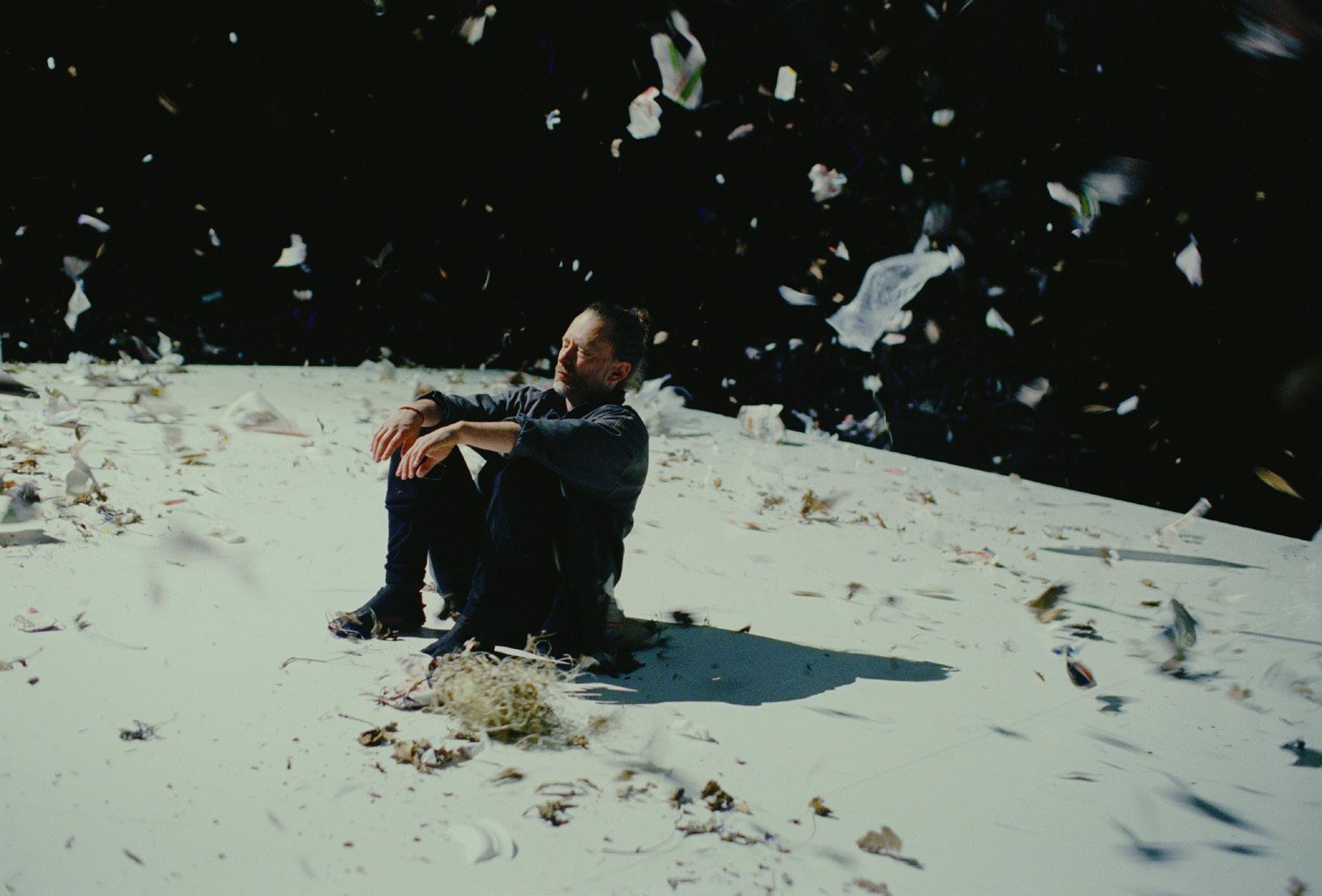
8 minute read
INEXPLICÁVEL RADIOHEAD
from Ahead mag
UNEXPLAINABLE RADIOHEAD
Como a banda de rock mais influente da atualidade se mantém no topo, criando discos cada vez mais experimentais e aclamados pelo público, e desafia padrões na indústria da música How today’s most influential rock band continues at the top, creating increasingly more experimental albums acclaimed by the public and challenging patterns of the music industry
Advertisement
ual banda de rock poderíamos chamar de a mais influente do mundo? Qual grupo ostenta letras e sons tão modernos e relevantes durante três décadas e não dá sinais de querer parar? Quem subverte padrões de comportamento na música, sem polêmicas e desavenças que levam tantas bandas de rock ao fim? Há um grupo que se encaixa em todos esses parâmetros. Ele trabalha há 34 anos em sintonia, com a formação original e, até, com o mesmo empresário. Tudo isso é Radiohead.
Em 1985, cinco rapazes que se conheceram em uma escola particular só para meninos na pequena cidade de Abingdon, Inglaterra, criaram a banda “On a Friday” — porque os ensaios na escola aconteciam só às sextas-feiras. Desde então, os meninos viraram astros da música, e a formação da banda nunca mudou. Só o nome, anos mais tarde, a pedido da gravadora EMI e inspirado na (já esquecida) música “Radio Head”, do Talking Heads.
Não fosse pelo conjunto da obra, e o Radiohead já seria objeto de estudo por manter a formação original por tanto tempo. Isso é realmente surpreendente em uma indústria onde o entusiasmo da juventude, aos poucos, dá espaço para diferenças de opinião e, consequentemente, a projetos solo. Agora, imagine que os membros do Radiohead têm gostos completamente diferentes, // What rock band could we call the world’s most influential? Which group splurges lyrics and sounds so modern and relevant for three decades, giving no sign that it wants to stop? Who subverts the patterns of behavior in music, without controversies and fights that lead so many rock bands to their end? There is one group that fits all these parameters. A group working together for 34 years in tune, with the same original formation and even the same manager. All this is Radiohead.
In 1985, five lads who met at a private school for boys only in the small city of Abingdon, England, created the band “On a Friday” – because rehearsals at school took place only on Fridays. Since then, the boys became music stars and the band’s lineup never changed. Only the name, years later, by request of their record company EMI and inspired by the (long-forgotten) song “Radio Head” by the Talking Heads.
Notwithstanding the body of work, Radiohead could be a subject of study for maintaining its original lineup for such a long time. This is really surprising in an industry where the enthusiasm of youth gradually opens the ground for differences of opinion and, consequently, solo projects. Now imagine that the members of Radiohead have completely different tastes, something that they usually joke about in their rare interviews. Besides, each member has distinct individual projects – that have never affected the band’s activities.
Picked as the 60th best guitar player of all time by Rolling Stone Magazine, Edward O’Brien takes part in the
Qpor/by Olga Kovalenko

algo sobre o que costumam brincar em suas raras entrevistas. Além disso, cada integrante tem projetos individuais distintos — e que nunca afetaram as atividades da banda.
Eleito 60º maior guitarrista de todos os tempos pela Rolling Stone, Edward O'Brien participa de gravações de trilhas sonoras para minisséries da BBC. Considerado o 26º maior baterista da história pelo site Gigwise, Philip Selway está envolvido em sessions de músicos britânicos. Enquanto isso, o baixista Colin Greenwood faz participações especiais em shows de outras bandas e seu irmão, o multi-instrumentista Jonny Greenwood (48º maior guitarrista pela Rolling Stone), acumula trilhas sonoras em filmes como “Sangue Negro” e “Trama Fantasma” (indicado ao Oscar), além de escrever complexas obras sinfônicas.
Isso sem falar em Thom Yorke, líder e alma do Radiohead: além de membro do supergrupo Atoms for Peace e autor de três álbuns solo, é considerado uma das pessoas mais influentes na música contemporânea atual — e que entrou para o Hall da Fama do Rock and Roll com todo o Radiohead em março de 2019, sem fazer questão de participar da cerimônia.
recording of soundtracks for BBC miniseries. Considered the 26th greatest drummer of history by the site Gigwise, Philip Selway is involved in sessions of British musicians. Meanwhile, bassist Colin Greenwood makes guest appearances in concerts of other bands and his brother, multi-instrumentalist Jonny Greenwood (48th best guitar player by Rolling Stone), accrues soundtracks for films like “There Will be Blood” and “Phantom Thread” (nominated for an Academy Award), besides writing complex symphonic pieces.
And this without mentioning Thom Yorke, leader and soul of Radiohead, as well as a member of the supergroup Atoms for Peace and the author of three solo albums, considered one of the most influential people in contemporary music – and who entered the Rock and Roll Hall of Fame with the rest of Radiohead, in March 2019, without bothering to attend the ceremony.
ANIMA In June, Thom Yorke released his third solo album, “ANIMA”. Moreover, the release lived up to Thom’s innovatively provocative style. From São Paulo to Tokyo appeared posters of a fictitious Anima Technologies promising to recover peoples’ lost dreams. Whoever called the phone number advertised
ANIMA
Em junho, Thom Yorke lançou seu terceiro álbum solo, “ANIMA”. E o lançamento fez jus ao estilo inovadoramente provocador de Thom. De São Paulo a Tóquio surgiram cartazes de uma fictícia Anima Technologies prometendo recuperar os sonhos perdidos das pessoas. Quem ligava para o telefone divulgado ouvia uma gravação falando que a empresa foi “capturada após ações ilegais”. E, então, a nova faixa “Not the News” ecoava do outro lado da linha. Simulta neamente, a Netflix lançou um curta-metragem magistral com três músicas de “Anima”, dirigido por Paul Thomas Anderson e que retrata o mundo onírico de Thom.
O artista britânico falou sobre o título do álbum em uma entrevista recente para a revista “The Sunday Times Culture”: “Eu sou fascinado pela ideia de que os sonhos incorporam nossa essência subconsciente — algo da teoria de Carl Jung. Mas, também, em italiano, anima significa alma. Isso me leva a pensamentos diferentes, por exemplo, sobre nossas personalidades na Internet — elas são como caras falsas que usamos para nos esconder”, analisa. “Jaron Lanier [cientista da computação americano] diz que nossas personalidades na Internet são versões bidimensionais de pessoas tridimensionais. E que se começarmos a valorizar mais essa versão de nós mesmos, isso nos leva a ansiedade e frustrações. O álbum é amplamente dedicado a isso.”
Questionado sobre seu processo de fazer música, Thom revela seu lado mais humano. “Na maioria dos casos, não quero ver o que estou fazendo. Se eu olhar, tudo começa a desmoronar, em todas as esferas da vida. Eu sou como aquele cara insolente que se senta em um canto e diz: ‘sim, e eu posso!’ E então ele se levanta e acontece que ele não pode. Esta é, em geral, uma descrição de toda a minha vida.”
Esta sincera insegurança, paradoxalmente, acompanha a criação de muitos discos que podem ser considerados obras de arte. Poucos artistas modernos têm esse sentimento. Muitos músicos medíocres se gabam enquanto Yorke tenta se esconder. E é essa ideia meio absurda de que Thom é incapaz de alcançar a plenitude que força ele a trabalhar incessantemente e a buscar sempre algo novo, mais complexo e mais profundo.
// Questioned about his process of making music, Thom reveals his more human side. “In most cases, I don’t want to see what I’m doing. If I look, everything starts crumbling down, in all spheres of life.”
heard a recording saying that the company was “captured after illegal actions”. And then, the new track “Not the News” echoed on the other side of the line. Simultaneously, Netflix released an incredible short subject with three songs from “Anima”, directed by Paul Thomas Anderson, depicting Thom’s oneiric world.
The British artist spoke about the title of the album in a recent interview to “The Sunday Times Culture” magazine: “I am fascinated by the idea that dreams incorporate our subconscious essence – something from Carl Jung’s theory. But, also, in Italian anima means soul. This leads me to different thoughts, for example, about our personalities on the internet – they are like fake faces that we use to hide,” he analyzes. “Jaron Lanier (American computer scientist) says that our internet personalities are two-dimensional versions of three-dimensional people. And that if we start valuing this version of ourselves more, this leads us to anxiety and frustration. The album is largely dedicated to that.”
Questioned about his process of making music, Thom reveals his more human side. “In most cases, I don’t want to see what I’m doing. If I look, everything starts crumbling down, in all spheres of life. I’m like that insolent guy who sits in a corner and says: “Yes, I can!” And then he gets up and it so happens that he can’t. This is, generally, a description of my whole life.”
This sincere insecurity, paradoxically, accompanies the creation of many records that can be considered works of art. Few modern artists have this feeling. Many mediocre musicians boast, while Yorke tries to hide. And it is this sort of absurd idea










